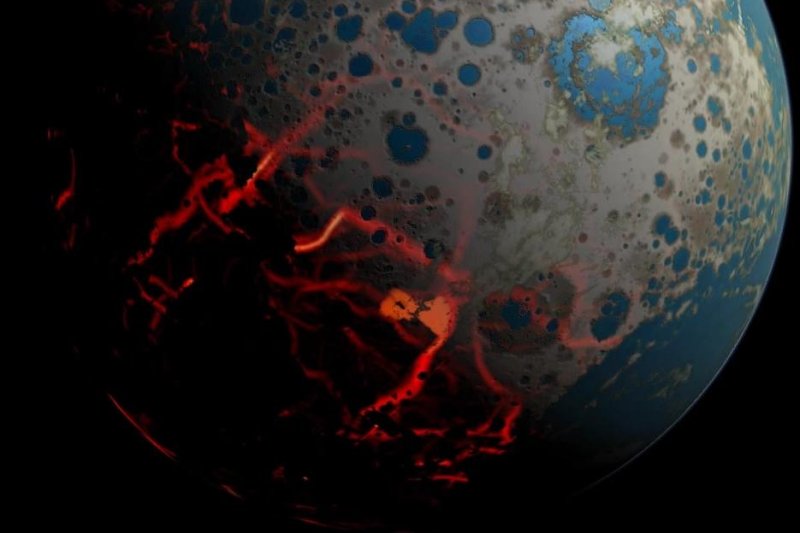Japanese scientists say they've found evidence of biological activity in rocks formed 3.95 billion years ago, when Earth was regularly bombarded by asteroids and comets. Photo courtesy of NASA
Sept. 27 (UPI) -- A team of Japanese researchers believe they've discovered the oldest known evidence of life on Earth. The scientists found signs of biological activity in 3.95 billion-year-old rocks from Labrador in northeast Canada.
The rock samples were formed when Earth was 500 million years old. During the Eoarchaean Era -- the first during which Earth featured a curst -- the planet was covered with volcanoes and still too hot for tectonic plates. Asteroids and comets regularly peppered Earth's surface. It was a rather inhospitable planet.
Yet, scientists continue to push back the date when life first emerged on such a planet.
Until now, scientists assumed the Late Heavy Bombardment prevented life forms from emerging prior to 3.8 billion years ago.
"It may be difficult to create life before 3.8 billion years ago due to the bombardment, which may destroy early life," Yuji Sano, a senior researcher at the University of Tokyo, told The Guardian. "But now it is 4 [billion] years. Life started on Earth during the heavy bombardment of meteorites, which is amazing."
Sano and his colleagues found unique carbon isotope ratios in fragments of graphite bore -- isotope ratios they say are identical to those produced by living organisms.
But rocks, especially ancient ones, can skew carbon isotope ratios over time as they are subjected to a variety of geologic forces. The conclusions of Sano and his colleagues -- detailed in the journal Nature on Wednesday -- are likely to face a heavy dose of skepticism.
"I would agree with their conclusion," Matthew Dodd, a researcher at the University College London, who was not involved with the research, told Discover Magazine. "However, for most people to be convinced, we'll need to see some other elements."
The researchers used geologic context to date the rocks.
"It is not necessary to directly date the age of samples with the graphite," said lead study author Tsuyoshi Komiya. "Geology is also important."
But some scientists suggest such ancient rocks, which have been stretched, pushed and pulled like saltwater taffy for billions of years, require more precise dating methods.
Though many won't be convinced, the research already has scientists talking, and the findings are in trend with previous findings, which have pushed the emergence of life earlier and earlier. If life did emerge during such a tumultuous period, it suggests life is more resilient than scientists previously thought.















